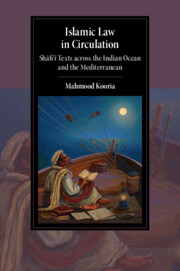Book contents
- Islamic Law in Circulation
- Cambridge Studies in Islamic Civilization
- Islamic Law in Circulation
- Copyright page
- Dedication
- Contents
- Figures
- Acknowledgements
- Notes on Transliteration, Dates and Places
- Chapter
- Introduction
- Chapter
- 4 The Code
- Chapter
- 5 The Commentary
- Chapter
- 6 The Autocommentary
- Chapter
- 7 The Supercommentaries
- Chapter
- 8 The Translations
- Conclusion
- Bibliography
- Index
- Other Titles in the Series:
4 - The Code
from Part II
Published online by Cambridge University Press: 24 March 2022
- Islamic Law in Circulation
- Cambridge Studies in Islamic Civilization
- Islamic Law in Circulation
- Copyright page
- Dedication
- Contents
- Figures
- Acknowledgements
- Notes on Transliteration, Dates and Places
- Chapter
- Introduction
- Chapter
- 4 The Code
- Chapter
- 5 The Commentary
- Chapter
- 6 The Autocommentary
- Chapter
- 7 The Supercommentaries
- Chapter
- 8 The Translations
- Conclusion
- Bibliography
- Index
- Other Titles in the Series:
Summary
“A text that revolutionised the Shāfiʿī school of law” is the best way to characterise the law book Minhāj, the central subject of this chapter. Soon after it was written in Damascus in the thirteenth century, it acquired an immense popularity among Shāfiʿī jurists, to the extent that no other text of the school ever achieved. In the following centuries, it not only influenced but also framed the very ways in which they discoursed about their school. It inspired generations of jurists in their legal-textual praxis, leading to the production of a copious amount of commentaries, supercommentaries, abridgements, poetic renderings, etc., and that continues to today. Its story presents an interesting phenomenon in the histories of Islamic law, law and Islam at large. This chapter explores its inception and trajectories. It asks why so many jurists engaged with the text and what made it so idiosyncratic that it influenced the textual discourses of such a large community across centuries. Embedded in the larger commentarial mode of juridical advancements of the time, it argues that Nawawī codified the school’s diverse opinions while synthesising the existing divisions. His own detailed engagements with the broader textual corpus of the school in his other works provided material for him to bring out a concise, comprehensive and coherent work that would address larger pedagogical and juridical requirements.
Keywords
- Type
- Chapter
- Information
- Islamic Law in CirculationShafi'i Texts across the Indian Ocean and the Mediterranean, pp. 129 - 172Publisher: Cambridge University PressPrint publication year: 2022

